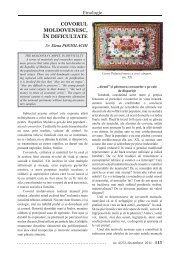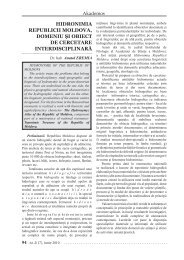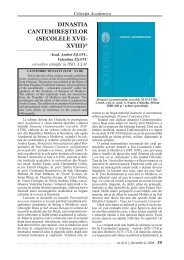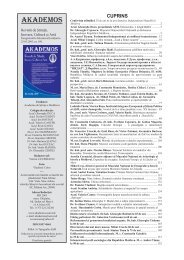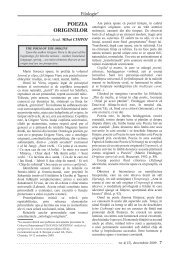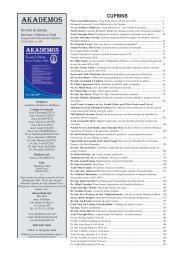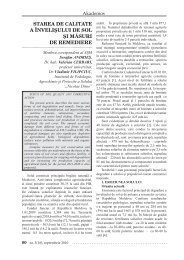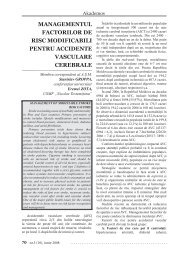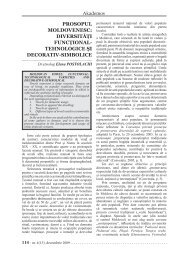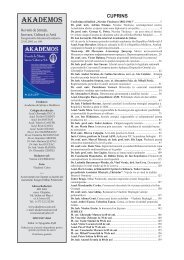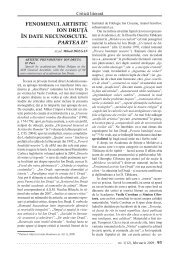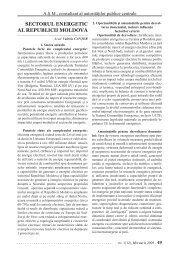2 - Akademos - Academia de ÅtiinÅ£e a Moldovei
2 - Akademos - Academia de ÅtiinÅ£e a Moldovei
2 - Akademos - Academia de ÅtiinÅ£e a Moldovei
- No tags were found...
You also want an ePaper? Increase the reach of your titles
YUMPU automatically turns print PDFs into web optimized ePapers that Google loves.
Ştiinţă Zoologie şi educaţieNEW REMEDIESFOR BEESRUDIC Valery 1 , TODERAS Ion 2 ,GUDUMAC Valentin 3 , DERJANSCHIValery 2 , BULIMAGA Valentina 4 ,CHIRIAC Tatiana 1 , ARCAN Elena 4 ,BOGDAN Valery 5 , ICHIM Maria 61Institute of Microbiology and Biotechnology ofAca<strong>de</strong>my of Sciences of Moldova,2Institute of Zoology of Aca<strong>de</strong>my of Sciences ofMoldova,3State University of Medicine and Pharmacy ofMoldova4Moldova State University,5“FICOTEHFARM “LTD, Chisinau, Moldova,6Institute of Bioengineering, Biotechnology andEnvironmental Protection “BIOING”, Bucharest,RomaniaREMEDII NOI PENTRU ALBINEAu fost elaborate tehnologii <strong>de</strong> producere a unorpreparate sanogene <strong>de</strong> o nouă generaţie Apispir şiBioR Sp având ca sursă primară biomasa <strong>de</strong> Spirulină. Pelângă efectul stimulator asupra prolificităţii, cantităţiişi calităţii produselor apicole, aceste preparate fortificăstatusul imun, contribuind astfel şi la <strong>de</strong>păşireainci<strong>de</strong>nţelor provocate <strong>de</strong> Colapsul familiilor <strong>de</strong> albine(CCD)Key words: Spirulina, biotechnologies, feed additive,remedy, bees.IntroductionThe apiculture is an important branch of nationaleconomy in the aspect of crops (more than 90)pollination and agriculture products obtaining.In recent years the apiculture suffers because ofthe big lost in production, caused by the infectiousdiseases that contribute to the diminishing of fertilityand productivity, increasing the rate of bees’mortality. Among the most wi<strong>de</strong>ly spread infectiousdiseases are: european and american foulbrood, septicemia,mycosis and virosis, which conduct to thebees <strong>de</strong>ath [7,11].Starting from 2006 the most actual problemwithout solution is CCD - Colony Collapse Disor<strong>de</strong>r,an anomaly that attains the acci<strong>de</strong>ntal proportions,the <strong>de</strong>creasing of bees family number from2,4 million to 900 thousand was registered in USA,disappearing of 10 million in Taiwan, – by 25% inGermany, and in some cases the loss was up to 80%[1,3-6].Diverse feed additives are used in bees nutritionfor the maintaining of their families and for theproductivity increase [7,10]. The products are expensive,contain synthetic amino acids and can berapidly exposed to the oxidation of proteic and lipidiccomponents that cause bees diarrhea after itsconsummation and affect the honey quality.The antibiotics, antifungici<strong>de</strong>s and antiviraldrugs are used in the eradication of families’ bees’infections in the exceptional cases. There are somedisadvantages of these remedies: synthetic nature,the possibility of accumulation in honey and thedanger of penetration into the human body, lowereffectiveness and higher cost [7].Thus the main principles of application of technologicalprocedures in the apiculture inclu<strong>de</strong> theelaboration of the new methods for ensuring andpromotion of vitality and bees families’ health, preventionof infection’s appearance and increasing ofbees families resistance against it.The aim of the investigation was to elaboratesome new sanogenic products for apiculture throughbiotechnological exploration of cyanobacteriaSpirulina platensis biomass.Material and MethodsThe strain of cyanobacteria Spirulina platensisCNM-CB-02, from the National Collection ofNon-Pathogenic Microorganisms of the Republicof Moldova, Institute of Microbiology and Biotechnologyof the Aca<strong>de</strong>my of Sciences of Moldova, isused as a source for obtaining of BioR Sp preparationand feed additive Apispir. Spirulina was cultivatedin the regime of accumulation, on SP-1 nutritionalmedium [8]. Cultivation lasted for 144 hours,respecting the cultivation parameters as following:temperature—30ºC, light intensity—3000 lx duringfirst 72 hours and respectively - 35ºC, 4000 lx in thenext 72 hours of the cultivation process.The physico-chemical properties and compositionof BioR Sp preparation and feed additive Apispirwere <strong>de</strong>termined by the methods, <strong>de</strong>scribed in[2,8].In the experimental investigations BioR Sp preparationand feed additive Apispir were used accordingto the scheme:0,5 ml BioR Sp preparation (10mg dry substance/ml)have been ad<strong>de</strong>d to 500ml of sucrose syrup(1:1) and used as supplement for autumn bees familiesnutrition.1-2ml Apispir (10mg dry substance/ml) feed additivehave been ad<strong>de</strong>d to 1000ml of sucrose syrup(1:1) and used as supplement for spring bees familiesnutrition.nr.4(11), <strong>de</strong>cembrie 2008 - 81




